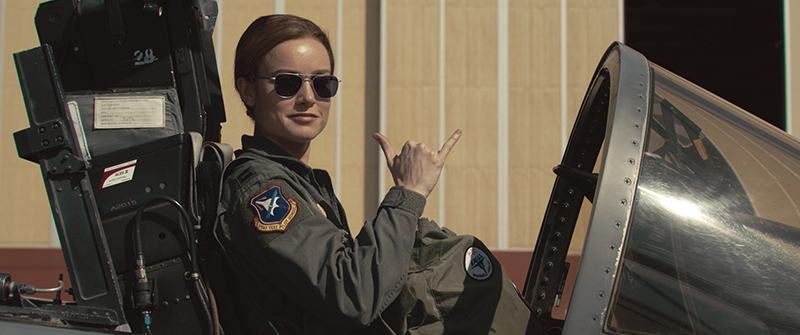Captain Marvel

Brie Larson in Marvel Studios' CAPTAIN MARVEL.

According to a 2018 New York Times article titled, “What It Was Like To Be One Of The First Female Fighter Pilots,” women constitute fewer than 6.5 percent of military pilots. While not an overt recruiting tool, in the sense that TOP GUN was in 1986, CAPTAIN MARVEL embraces an ethos that is sure to have some impact, directly or indirectly, on these figures. The film, whose star Brie Larson pushed for greater inclusiveness in media, makes its case first by humanizing, then empathizing. As one character opines, “This is war. My hands are filthy from it, too.”
The architect of this war between Kree and Skrull species, the Supreme A.I., interacts with the subconscious mind of the Kree empire’s star warrior, Vers (Larson). These indoctrination sessions trigger apparent memories of another life, possibly on Earth. In one mission to destroy Skrull fortifications, Vers is blown out of an escape pod and crashes into a Blockbuster Video. Unless the chain store managed to expand to other planets as a last ditch effort to survive the Format Wars of the early 21st century, it’s likely she landed somewhere on Earth in the 90’s. If that doesn’t seal the deal, the disaffected mini-mall cop does.
There’s cleverness in casting Jude Law as Vers’ Kree mentor Yon-Rogg and Ben Mendelsohn as their adversary, Talos. You see it coming, but the filmmakers manage to wring out the empathy from what could easily become a drag if it weren’t for the LONG KISS GOODNIGHT vibes flowing between and Larson and SHIELD investigator Nick Fury (Samuel L. Jackson). That’s not a bad thing. Released in 1996, the Geena Davis action vehicle is better reference material for the subversive, Cold War subtext of CAPTAIN MARVEL than grunge music—a genre that undermined its own edge the moment Eddie Vedder took to MTV to complain about how mainstream his own music had become.
Obvious to anyone paying attention, self-discovery is the driver of this introduction to the titular character. The humanizing within the story sets CAPTAIN MARVEL just behind BLACK PANTHER and CAPTAIN AMERICA: THE WINTER SOLDIER in narrative and character substance. Out of her reconciliation with fellow pilot Maria Rambeau (Lashana Lynch), we see the parallel stories of two over-achieving women who strived to be test pilots—a highly specialized branch of aerospace research traditionally dominated by men, most famously Chuck Yeager, hence the references to Phil Kaufman’s THE RIGHT STUFF. One of the subjects of the Times piece, Maj. Lisa Clark, was my high school classmate and fellow Civil Air Patrol cadet. I saw firsthand the dedication and determination of a young woman aspiring to be an Air Force Academy Cadet and, later, a B-1 bomber pilot.
In Vers’ search for answers about the highly-classified Project Pegasus, a theme emerges of marginalized people trying to make it in someone else’s world. How we get there isn’t through tropes and brow-beatings, but through honest dialogue after the chase sequences and fist-fights prove futile. Zak Snyder could take a few lessons from screenwriter/directors Anna Boden and Ryan Fleck: Lead with the action, end on the character development—not the other way around.
Whether one understands the winks to fighter jock films or nods to the past exploits of Marvel characters Nick Fury and Agent Coulson (respectively, the digitally-Benjamin Buttoned Jackson and Clark Gregg), CAPTAIN MARVEL becomes its own thing. As in THE WINTER SOLDIER, our skeptical protagonist takes us on a more intimate journey, as she questions her allegiance in an atmosphere of suspicion, propaganda, and conspiracy. How can she save her world if she can’t be certain for whom it’s saved? Not a trivial question in these times.
We must not only learn to tolerate our differences. We must welcome them as the richness and diversity which can lead to true intelligence.
-Albert Einstein